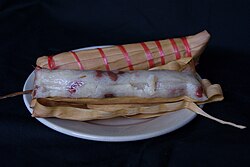Lepet
This article needs additional citations for verification. (July 2014) |
 Lepet, sticky rice dumpling with peanuts cooked in coconut milk | |
| Alternative names | Leupeut (Sundanese), Lepat (Malay/Indonesian) |
|---|---|
| Type | Dumpling |
| Place of origin | Indonesia |
| Region or state | Central Java, East Java, Yogyakarta, and West Java |
| Main ingredients | Sticky rice, coconut milk, peanuts, wrapped in young coconut leaf |
Lepet (Javanese), Leupeut (Sundanese), or Lepat (Malay/Indonesian) is a type of sticky rice dumpling mixed with peanuts cooked with coconut milk and packed inside a janur (young coconut leaf) or palm leaf. It is a delicacy commonly found in Javanese and Sundanese cuisine (of Java, Indonesia), and often consumed as a snack. It is similar to lontong, but with a stickier texture and richer flavor due to the use of coconut milk and peanuts.
Lepet is made by steaming the ketan (sticky rice) until half cooked in coconut milk then mixed with pandan leaf and salt until all of the coconut milk is absorbed into the sticky rice. Then the half-cooked coconut milk sticky rice is mixed further with grated coconut flesh and peanuts then wrapped inside janur (young yellowish coconut leaf) in a cylindrical-shape and secured with strings made from coconut leaf fibers (or any kind of strings). The rice packages inside the coconut leaf are then steamed further until completely cooked. The most common filling is peanuts, however other kinds of beans such as kidney beans, cowpeas, jack beans, or corn might also be used.[1]
In the Sundanese area of West Java, it is known as leupeut and usually made in a smaller size with peanut filling and usually consumed with tahu sumedang (fried tofu). It is a popular snack in the Kuningan and Sumedang Regency.
In Sumatra, Indonesia and the Malay Peninsula there is a similarly named food known as lepat, although the recipe and method are slightly different as lepat uses palm sugar and grated coconut flesh fillings which are wrapped inside a banana leaf instead of a young coconut leaf.
See also[]
- Burasa
- Ketupat
- Lemang
- Lemper
- Lontong
- Suman
- List of dumplings
- List of steamed foods
References[]
- ^ "Lepet Ketan & Kacang Tolo" (in Indonesian). Sajian Sedap. Retrieved 31 July 2014.
External links[]
- Indonesian rice dishes
- Steamed foods
